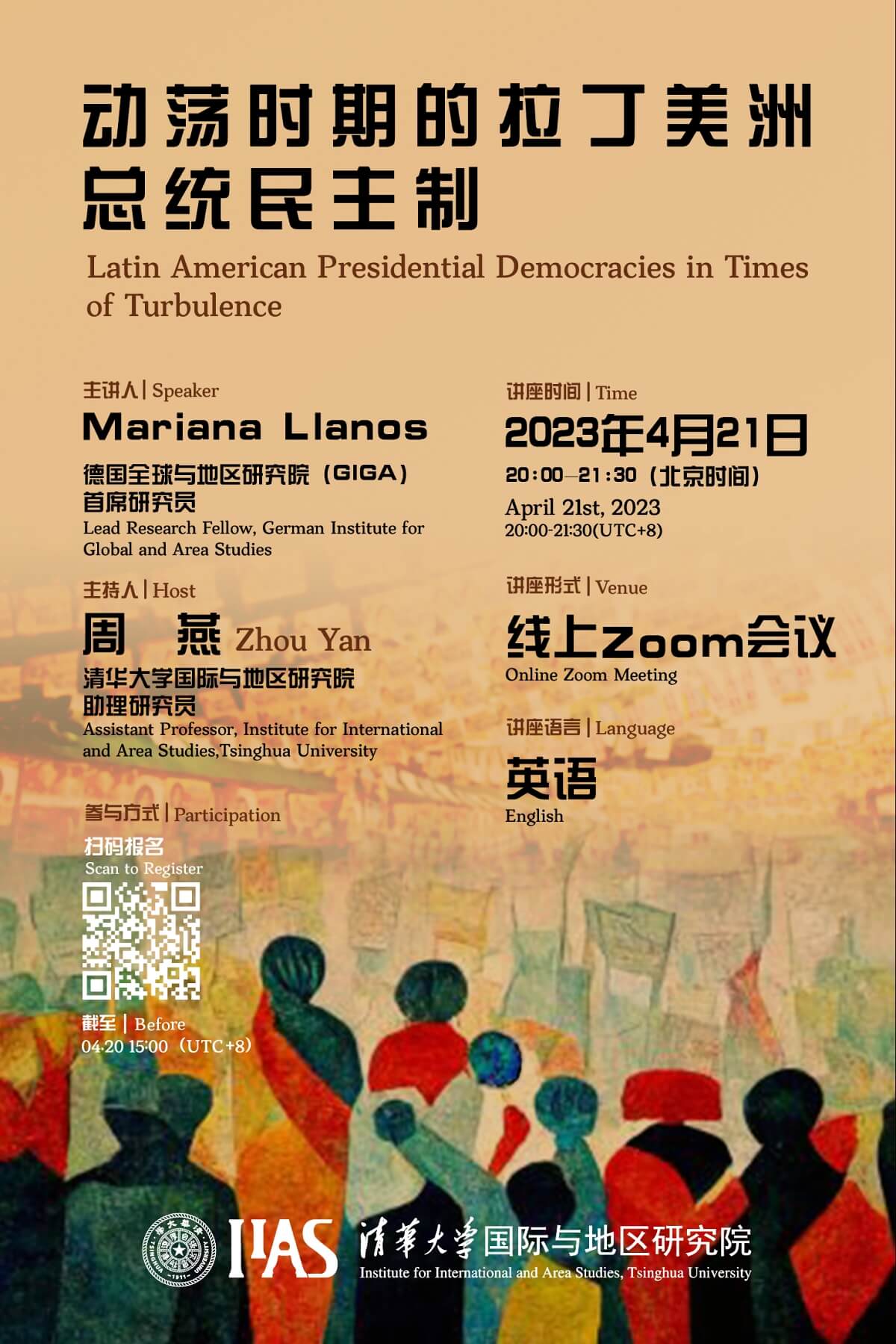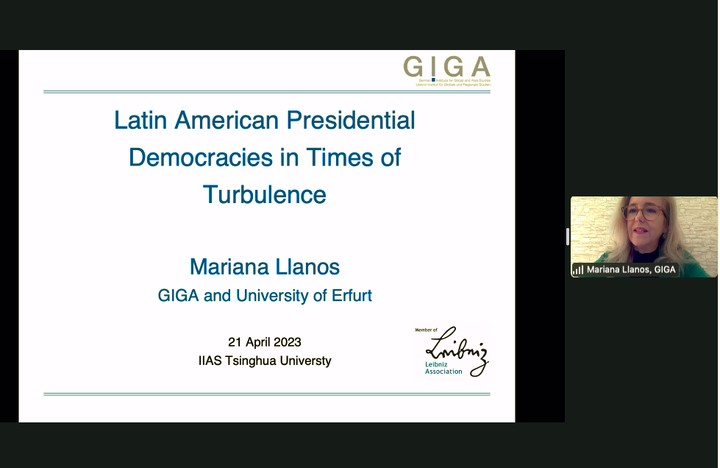
IIAS Latin American Studies Lecture Series | Latin American Presidential Democracies in Times of Turbulence

On the evening of April 21, 2023, the Institute for International and Area Studies (IIAS) of Tsinghua University hosted an online lecture themed “Latin American Presidential Democracies in Times of Turbulence,” which was attended by a number of scholars and students within and outside of the IIAS. The lecture was delivered by Mariana Llanos, Lead Research Fellow of the German Institute for Global and Area Studies (GIGA), and presided over by Zhou Yan, Assistant Professor of the IIAS.
Professor Llanos started with introducing the background of the “times of turbulence,” which mainly involved three aspects. First, the emergence of political representation crises has led to growing public distrust in representative institutions and elections. Second, the wave of social protest swept across multiple countries in Latin America in 2019. Third, impacted by the COVID-19 pandemic, the power of governments has become more centralized, while individual rights have been weakened.
Professor Llanos explained several concepts relevant to political system, such as president, legislature, the relationship between law-making institutions, and democracy. Then, she introduced the concept of presidential democracy and delved into the collapse of the presidential system, especially institutional collapse caused by presidential impeachment. Noting the limitations of presidential impeachment, Professor Llanos analyzed the problems and difficulties from two perspectives. Within the framework set by the constitution, a president can be impeached if they are found to be involved in unconstitutional acts; otherwise, impeachment may fail or not occur. There is some leeway in reality. First, the prevailing power of a president results in the absence of accountability mechanisms. Consequently, even if the president is guilty, impeachment can fail or doesn’t occur at all. Second, when the opposition has the upper hand, presidential impeachment becomes a means of political game. In this case, the president may be impeached even if they are innocent. For example, even though impeachment proceedings were launched over a hundred times during his presidency, Brazil’s former president Jair Bolsonaro still served the term by acting as congress president, aligning with centrists, politicizing supervisory agencies, etc., which in turn increased the risk of democratic erosion. The picture is strikingly different in Peru. As a result of repeated corruption accusations from 2016, several presidents of Peru were impeached. In recent years, the country has been beset by political instability, as evidenced by the dissolution and redo election of the parliament and changes in the president and prime minister, which has eventually resulted in conflict escalation rather than resolution, weakened credibility and growing public dissatisfaction.
Finally, Professor Llanos guided the audience to think divergently about whether impeachment is the ultimate way to address political representation crises.
During the Q&A session, Professor Llanos had an in-depth and lively exchange with the audience on various topics, such as the power struggle between the legislative body and the president, the impact of aggravated political polarization in Latin America and the role of economic stagnation in political representation crises and presidential impeachment. The lecture ended with a big round of applause.

Mariana Llanos is a Lead Research Fellow at the German Institute for Global and Area Studies (GIGA) and holds a D.Phil in Politics from the University of Oxford. Her research interests include political systems, congresses and judicial systems in Latin America, the relationship between the president and the congress/judiciary, etc., with the target areas spanning Latin America, Argentina and Brazil. Professor Llanos is the author of a number of papers, such as Cortes Superiores y redes sociales en América Latina, Presidential Preferences? The Supreme Federal Tribunal Nominations in Democratic Brazil, and Councils of Elders? The Senate and Its Members in the Southern Cone, which are published in Revista Uruguaya de Ciencia Política, Latin American Politics and Society, Latin American Research Review and other academic journals.
Contributed by: Xu Shuai
Proofreader: Zhou Yan
Typesetting editor: Cheng Yao
Related Content
- Russian Economy and Eurasian Economy Lecture Series: Lecture 5 | Russia’s Economic Growth Model and Resource Dependence
- Russian Economy and Eurasian Economy Lecture Series: Lecture 4 | Russia’s Economic Strength and Social Development
- Russian Economy and Eurasian Economy Lecture Series: Lecture 3 | Russia’s Economic Transformation and Building of Modern Market Economy
- Russian Economy and Eurasian Economy Lecture Series: Lecture 2 | The Relevance of Historical and Cultural Factors to World Economic Analysis: A Case Study on the Economy of Russia and Ukraine Before and After the Conflict

